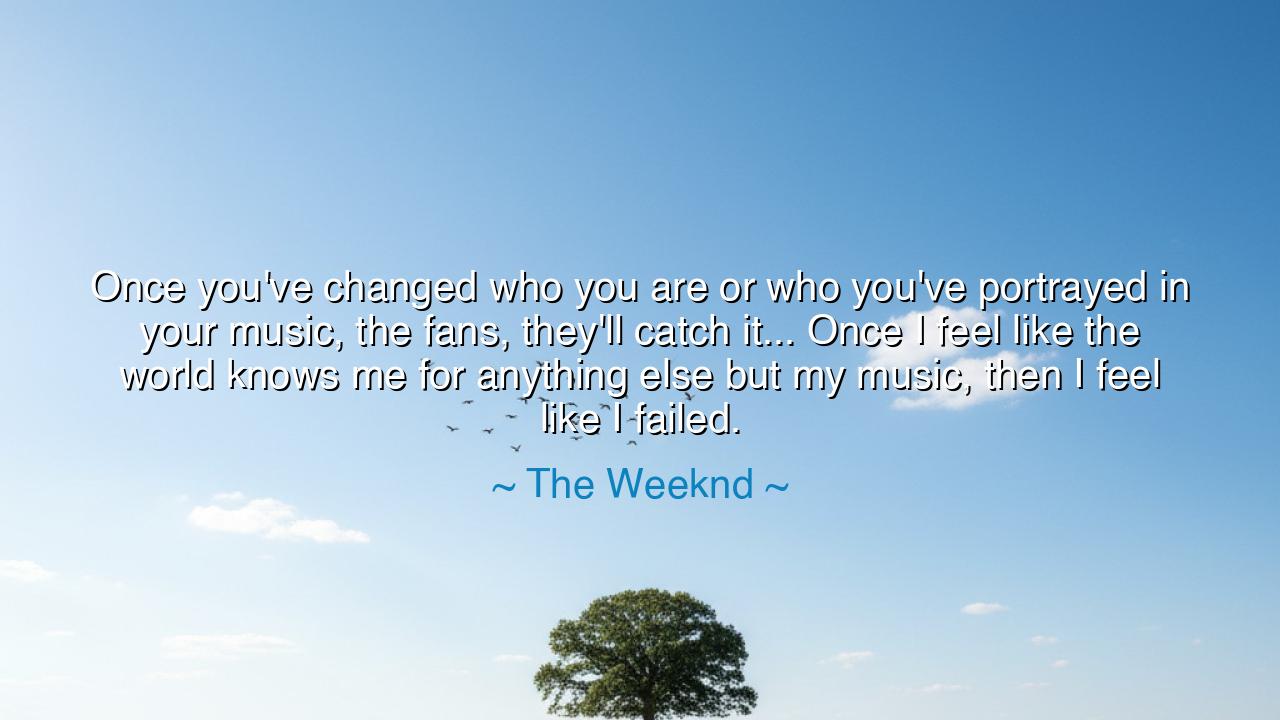
Once you've changed who you are or who you've portrayed in your
Once you've changed who you are or who you've portrayed in your music, the fans, they'll catch it... Once I feel like the world knows me for anything else but my music, then I feel like I failed.






“Once you’ve changed who you are or who you’ve portrayed in your music, the fans, they’ll catch it… Once I feel like the world knows me for anything else but my music, then I feel like I failed.” Thus speaks The Weeknd, a voice born from shadows and echoes, a poet of the night who clothed his truth in sound. In these words is not vanity, but a fierce devotion to authenticity, to the sacred bond between artist and audience. He proclaims that to betray one’s essence, to put on a mask for the sake of fame or applause, is to break the invisible thread of trust that ties creator to listener. For music, he declares, is not merchandise but selfhood, not performance but identity.
The origin of this wisdom lies in the ancient relationship between artist and people. From the singers of Homer’s epics to the griots of Africa, the power of art has always rested in truth. A bard might ornament his tale, but the spirit of the story had to be genuine, or the listeners would know it was false. The Weeknd echoes this tradition: the audience may not always know the life of the artist, but they know when the song rings hollow. They know when the portrayal no longer springs from the depths of reality. Authenticity cannot be faked, for the soul recognizes truth instinctively.
Consider the example of Bob Dylan, who was once crowned the voice of a generation. When he changed his style from acoustic folk to electric rock, his audience reacted with outrage, not because the music lacked power, but because they felt he had turned his back on the image of authenticity they had given him. Dylan, of course, remained true to himself, but his story shows the fragility of the bond between creator and fans. The Weeknd’s words warn against bending that bond for falsehood, for the moment an artist becomes known more for spectacle than for music, the trust begins to dissolve.
Or reflect on Nina Simone, whose artistry was rooted in her very being. She did not sing to please, nor to conform, but to embody her truth—whether it was sorrow, rage, or love. Her fans knew her music was her soul, and because of that, her legacy endures. She was not distracted by the trappings of fame, for she understood, as The Weeknd does, that to be remembered for anything other than the essence of the art is to lose the very reason for creating. Music, for the true artist, is not accessory but destiny.
The Weeknd’s words also reveal a warning to this generation. In a world where celebrity often overshadows craft, where scandal or spectacle can define a person more than their creation, he draws a line in the sand. He insists that his name must be synonymous with his music—not with gossip, not with image, not with fame detached from art. His creed is both protective and noble: if the world forgets the music and remembers only the man’s shadow, then the artist himself is diminished.
The lesson for us is clear: live and work with authenticity. Do not twist yourself into what others demand, nor put on a mask to win applause. Those around you, like the fans of an artist, can feel the difference between truth and falsehood. They may not always articulate it, but they will know when you have abandoned your essence. Guard your integrity as you guard your breath, for it is the core of your legacy. Let your identity flow into your work, and let your work be the true reflection of your being.
Therefore, let each one act with devotion. If you create, let it be honest. If you labor, let it reflect your true values. Seek not to be remembered for masks or roles, but for the work that was faithful to your essence. For the world may praise illusions for a time, but in the end, only what is genuine endures. Success without authenticity is failure; failure with authenticity is honor.
So let The Weeknd’s words be carved into memory: “Once I feel like the world knows me for anything else but my music, then I feel like I failed.” Take them as both warning and command. Whatever your art, your work, your life’s offering—let it be true. For truth sings louder than fame, and authenticity outlives illusion.






AAdministratorAdministrator
Welcome, honored guests. Please leave a comment, we will respond soon